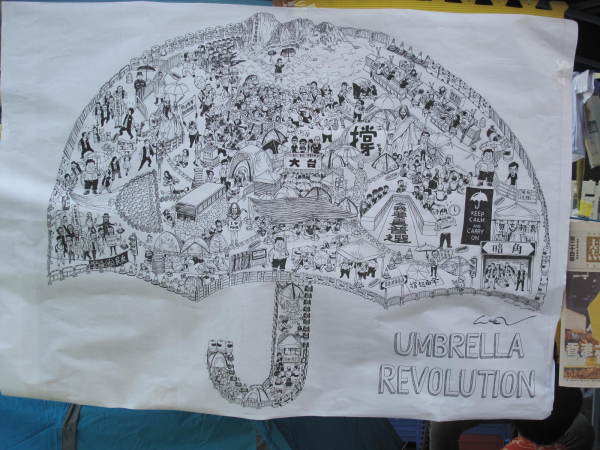We reproduce below the circular of Steve Vickers & Associates (SVA) which is a specialist risk mitigation, corporate intelligence, security and consulting company serving financial institutions, private equity funds, corporations, high net-worth individuals and insurance companies and underwriters around the world.
Written from a different point-of-view from Pressenza’s, none-the-less its content is worth considering and taking into account by those taking interest in Hong Kong. Contrary to the circular, the Umbrella Movement far from failing – as stated below – has consolidated a creative opposition to the simplistic materialism and paternalism pre-protests.
A future for Hong Kong is now seen where a really peaceful and stable society can come through what was, after all, relatively minor chaos. Thereby allowing true human values to be placed central to affairs and not the silly-old-dollar as evident today.
Report starts…/
Officially, the Occupy Central protests lasted 79 days. The adverse effects of the occupation will likely linger on much longer and be felt much more heavily than any inconveniences caused by the protests; this is because two major fault lines were breached:
Firstly, poor leadership and judgement by both the Hong Kong Government and the organisers of Occupy Central, have provided a pretext and groundswell of local support and legitimacy for the mainland Government to overtly assume a more direct role in Hong Kong’s affairs. This increased mainland presence and influence in and over Hong Kong will certainly not dissipate now that the overt protests have subsided.
Secondly, the Government(s) involved – not the Police, either by design or through sheer incompetence, acquiesced to dubious elements, including Triad Societies and New Territories indigenous organisations to act in direct opposition to the demonstrators. These forces; now unleashed will need to be appeased and/or contended with going forward. Putting them “back into the bottle” will be a challenge for government and for the Police in particular.
As a result of the above, we believe that Hong Kong, as a direct result of the Occupy movement, will likely experience consequences in the following key areas: Politics; Security; the Legal System; Education, the Media and Business.
As to politics, there is a large degree of uncertainty about what will happen looking forward but the inescapable bottom line is that the students failed to achieve their aims; and the lamentable in-ability of the pan-Democrats to play a leading role in the protests has diminished their status, which, if they lose their seats will further delegitimise the existing legislative framework and lead to continuing discord.
Probably most troubling: the crisis greatly sped up the process by which power has shifted from the Hong Kong Chief Executive to the head of the Central Government Liaison Office. Now firmly underway, it is hard to envision this process as anything other than a one-way street.
The security of Hong Kong, as assessed by Beijing is more about “internal” security as directly related to possible threats to public order and stability in other parts of China, caused by activism and discontent originating from Hong Kong. Along these lines we believe that Beijing will now reappraise security arrangements so as to prevent comparable disorder emerging again. Measures may include some form of permanent expansion of the Public and State Security Bureau’s presence in Hong Kong and an adjustment to the PLA’s Hong Kong garrison to include overt elements of the Peoples Armed Police.
At the nexus of where political and security issues cross, such concerns about future instability could well provide credible cause to reintroduce efforts to codify Beijing’s instance on a passive Hong Kong. Many citizens in Hong Kong, angered by the Occupy campaign might well acquiesce to this.
Possible ramifications for the Hong Kong’s legal system are also possible. The Judiciary was forced to exercise a far greater role in ending the crisis than should have been allowed, or was necessary; yet, true-to-form, it maintained its independence throughout. Beijing; however, is unlikely to view this independence as entirely beneficial. The Law Society and other bodies may also come under pressure to field more “patriotic” officers.
Education and the media are also areas where we believe that ramifications will be clearly felt. The prominence of students within the protest movement means that the education sector will most likely become a focus of Beijing’s longer term attention. Much like what has already occurred in Macau, certain academics and those empowered to appoint them may find life more difficult.
Much in the way that Beijing will increasingly expect more obedient institutions; China’s leaders may also subtly favour more “patriotic” businesses, as is true on the mainland. Along these lines any diminution in the rule of law might affect the popularity and viability of Hong Kong as a commercial centre.
Ironically, when carefully and dispassionately considered, the net effect of the Occupy movement has been the opposite of what was intended. This is a terrible “own goal” and one that will take years from which to recover. Hong Kong’s existing freedoms are now under greater pressure than before, because an enlarged PRC Intelligence and security presence has been justified to the wider local population. Key institutions such as academia, law and the media organisations will be under greater pressure than before the movement commenced and substantial political ramifications, such as the reintroduction of Article 23, are now real possibilities.
One Country – Two Systems was always going to be a “fudge” – the pendulum has now swung decidedly in the one country direction.
* * * * * *
www.stevevickersassociates.com










